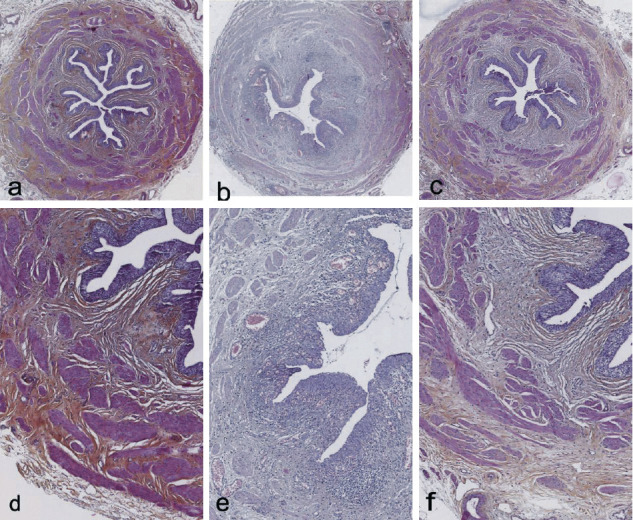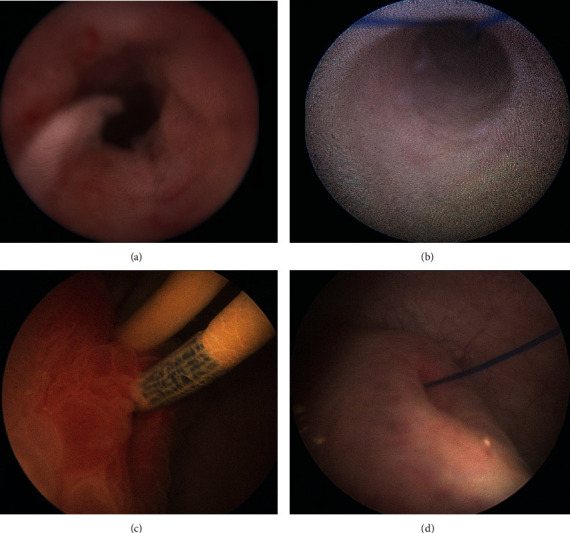人类输尿管组织学炎症的初步研究:健康输尿管或安装双尾支架或0.3 F细缝线。
IF 2.3
Q3 UROLOGY & NEPHROLOGY
引用次数: 9
摘要
背景:输尿管支架不耐受降低患者的生活质量。有人建议改变支架的形状可以减少不适。在以往的研究中,采用0.3 F细缝线的创新型辫子-缝线支架(即JFil®或MiniJFil®)可显著降低支架相关症状。幸运的是,发现输尿管扩张包含缝合线。此外,内窥镜检查缝合线周围输尿管壁未见炎症反应。在这项初步研究中,我们评估了人类输尿管在健康或装有双尾管支架或螺纹时的输尿管炎症。材料和方法:经患者同意并纳入方案,在膀胱肿瘤切除术过程中收集15段输尿管。用苏木精-伊红染色组织学切片评估输尿管炎症。对输尿管粘膜炎症和肌肉层炎症进行组织学分级(累积范围0 ~ 6)评估炎症。结果:所有输尿管双尾支架置入患者均有明显的输尿管炎症反应,平均炎症评分为4.8±0.4。细缝线组输尿管仅1例出现炎症,平均炎症评分为1.8±1.3 (p=0.001)。结论:虽然本研究受限于患者数量少,但证实双尾管支架在所有病例中均引起输尿管炎症,且0.3 F细缝线比双尾管支架引起的输尿管炎症少。为了减少对粘膜的刺激,在尿路内减少物质的概念似乎是必要的。JFil®或MiniJFil®线程可以满足此要求。本文章由计算机程序翻译,如有差异,请以英文原文为准。


Histological Inflammation in Human Ureter either Healthy or Fitted with Double-Pigtail Stent or a Thin 0.3 F Suture Thread: A Preliminary Study.
Background Ureteral stent intolerance reduces patients' quality of life. It has been suggested that changes in the shape of stents could decrease discomfort. In previous studies, the innovative pigtail-suture stent (i.e., JFil® or MiniJFil®) with a thin 0.3 F suture thread significantly decreased stent-related symptoms. Fortuitously, a dilation of the ureter containing the sutures was discovered. In addition, no inflammation was seen on the ureter wall around the suture in endoscopy. In this preliminary study, we assessed ureteral inflammation in the human ureter when it was healthy or when fitted with a double-pigtail stent or a thread. Materials and Methods After consent and inclusion of patients in the protocol, fifteen segments of ureters were collected during cystectomy procedures for bladder tumors. Ureteral inflammation was assessed on the histological section stained with hematoxylin-eosin. Histological grading (cumulative range of 0 to 6) assessing inflammation was performed on the ureter section for mucosa inflammation and inflammation in the muscle layer. Results A marked ureteral inflammatory reaction was observed in all cases of ureters fitted with a double-pigtail stent with a mean inflammation score of 4.8 ± 0.4. The ureter fitted with the thin suture thread showed inflammation in only one case with a mean inflammation score of 1.8 ± 1.3 (p=0.001). Conclusion Although the study was limited by the small number of patients, it confirmed that the double-pigtail stent induced ureteral inflammation in all cases and the thin 0.3 F suture thread caused less ureteral inflammation than the double-pigtail stent. The concept of material reduction within the urinary tract seems necessary in order to decrease mucosal irritation. The JFil® or the MiniJFil® thread could meet this requirement.
求助全文
通过发布文献求助,成功后即可免费获取论文全文。
去求助
来源期刊

Advances in Urology
UROLOGY & NEPHROLOGY-
CiteScore
2.90
自引率
0.00%
发文量
17
审稿时长
15 weeks
期刊介绍:
Advances in Urology is a peer-reviewed, open access journal that publishes state-of-the-art reviews and original research papers of wide interest in all fields of urology. The journal strives to provide publication of important manuscripts to the widest possible audience worldwide, without the constraints of expensive, hard-to-access, traditional bound journals. Advances in Urology is designed to improve publication access of both well-established urologic scientists and less well-established writers, by allowing interested scientists worldwide to participate fully.
 求助内容:
求助内容: 应助结果提醒方式:
应助结果提醒方式:


